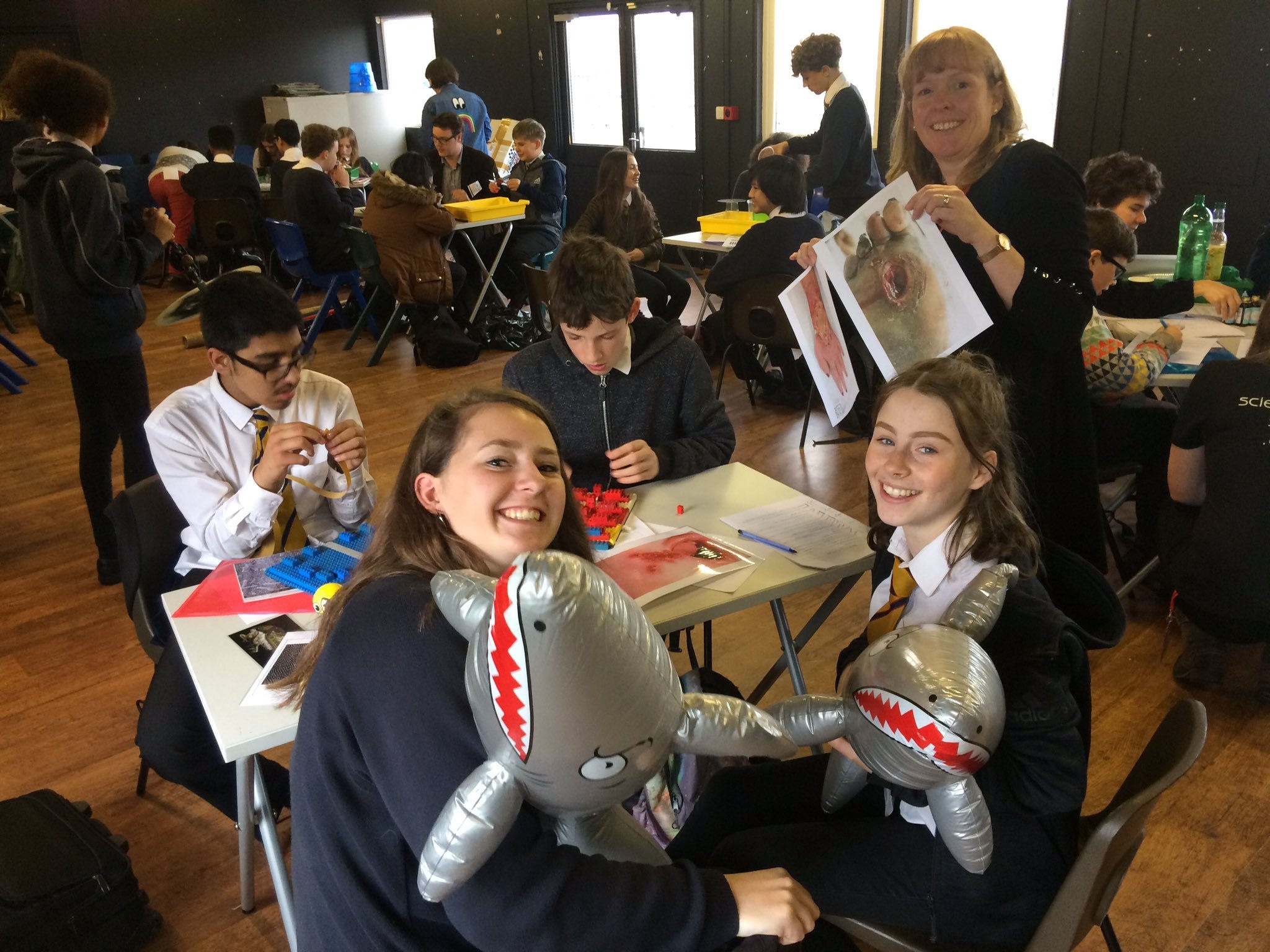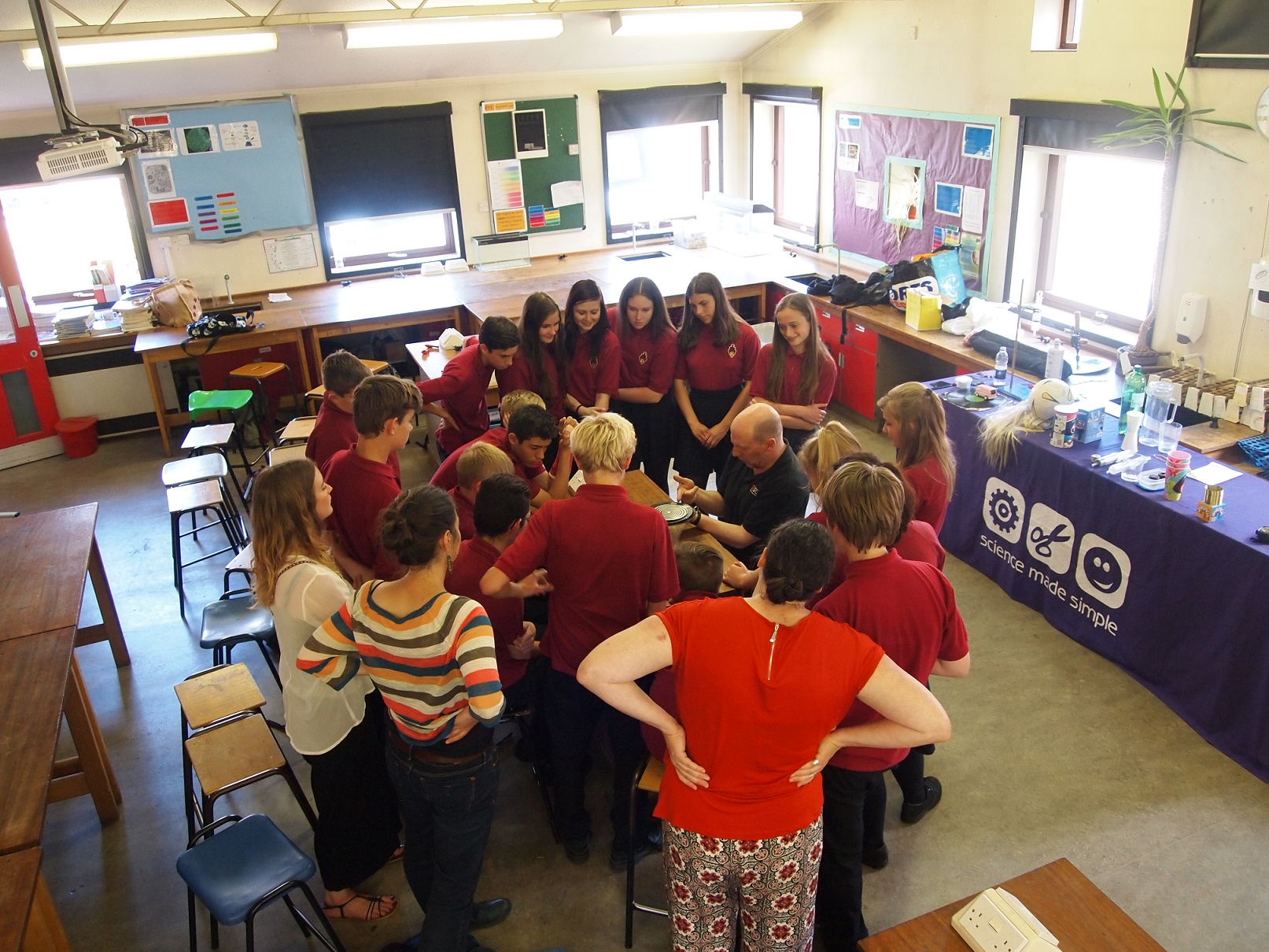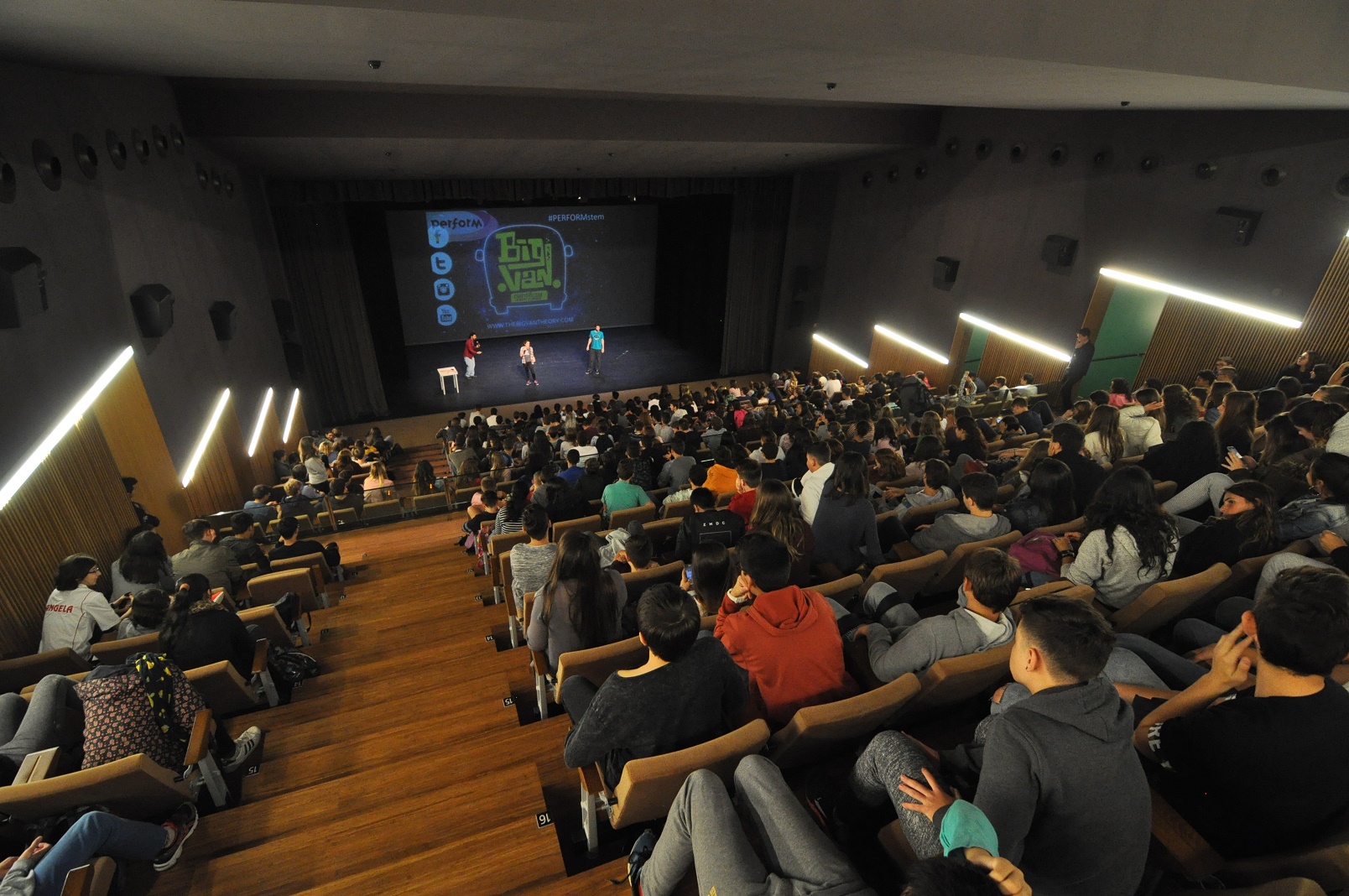
Isabel Ruiz Mallén
Participatory engagement with science and technology through performance
Reading time: 10 minutes.
Are performing arts an effective way of engaging adolescents in science learning?
Our consortium aims to investigate the impact that innovative and participatory science education methods based on the performing arts have on fostering secondary school students’ motivations and engagement in science, technology, engineering and mathematics (STEM). To meet this goal, PERFORM is actively involving students, their teachers, and voluntary early career researchers in inquiry-based learning about scientific topics by using different arts-based methods. We are experimenting with clowns using improvisational theatre, stand-up comedy, and busking theatre to foster students’ interest in STEM and related careers.
PERFORM was conceived as a way to provide alternative approaches in science education theory and practice to reinforce young students’ positive perceptions and attitudes towards science and scientific careers. From previous studies (such as DeWitt et. al., Archer et.al. and Bøe et.al.) we know that European adolescents often have a narrow concept of science and perceive its inherent complexity as a barrier, which can discourage them from science and studying for such careers. Many students also struggle to identify, on a cultural level, with science and hence do not aspire to have scientific careers. This lack of aspiration is seen particularly among girls and those from low socio-economic backgrounds. In this sense, results from the 2008 Flash Eurobarometer on young people and science already showed that important gender differences exist regarding students’ preferences for future careers and jobs. Boys were more interested in engineering or mathematics than girls, who generally argued that they did not have the skills for studying engineering, biology or medicine.

Why does young people’s disinterest in science exist?
Young people, and particularly girls, can be influenced by the negative stereotypical and problematic image of scientists that dominates among adults. Scientific research is often perceived as not related to human and societal needs, but rather with economic interests. Also, scientific careers are sometimes perceived as useless and unprofitable. During the financial crisis in Spain in 2008, for instance, one third of the population perceived science as an unattractive career option for young people, and a similar percentage was not interested in science. A negative image of science such as this one can discourage adolescents from investing effort and time in scientific learning. Moreover, young people’s current list of role models, fed by the media, does not usually include scientists. Those in the media, such as football players and pop artists, have a more interesting, profitable and consequently attractive life for boys and girls. As a result, young people can be under the impression that, to be like their idols, they do not need scientific knowledge. Regarding gender, stereotypes can particularly discourage girls from studying STEM because of the socially perceived incompatibility of female gender roles in science. A study in France showed that boys were described by their peers as having more talent and ability in maths than girls, while girls whose preferred subject was physics were described as lacking in “femininity”. Therefore stereotypes alone cannot explain completely gender inequities in STEM education; patriarchal structures must also be considered.
Most of the science education activities addressed to secondary school students in Europe are still related to a vertical and unidirectional transfer of information based on expert knowledge, from the teacher to the students. Although theoretical debates in pedagogy and communication have replaced the information deficit by introducing two-way dialogue aimed at increasing young people’s active involvement in science as well as public support for research, such a change in science education and communication practice is not yet a reality. Educational approaches actively involving students are often lacking in the curricula, despite their proven ability to enhance students’ engagement.
How is PERFORM addressing this challenge?
To address the challenge of students’ engagement in science, PERFORM is fostering direct interaction between young people and researchers in the early stages of their career so that students can get inspiration from “real” scientists. Students’ motivation towards science can be increased by creating empathy with scientists through the sharing of their personal stories, for instance, by talking about their own motivations and the personal experiences behind their scientific practice. By showing that “real” scientists are far from the stereotypical image of an old, crazy white-haired man who always dresses in a lab coat, students go beyond appearances and become interested in knowing about and understanding their work.
Furthermore, PERFORM works to overcome that last hurdle between young people and science and to break the unidirectional model of scientific knowledge transfer still prevalent in science teaching and learning in formal settings. It does so by connecting science with the arts, from STEM to STEAM.
Last but least, PERFORM encourages students to better understand the nature of science and reflect on its uncertainties and challenges by unveiling and addressing ethical issues related to science, and reflecting on scientific impacts and applications in real life. It also discusses power relationships in terms of gender issues. This last point explicitly addresses the values of the responsible research and innovation (RRI) concept.
PERFORM’s science communication
To go about this, PERFORM’s science communicators first created new performance-based science education activities addressing the RRI values. Clowns and improvisational theatre were used in France, stand-up comedy in Spain, and science busking in the UK. These activities used an innovative approach because they combined science and the performing arts to reflect on gender inequality in research, science-related stereotypes, young people’s concerns about the challenges facing Europe and the role of science in addressing them, ethical issues related to the scientific practice, and other RRI-related issues. PERFORM science communicators performed these performance-based science education activities before more than 2,400 students in 35 secondary schools in France, Spain and the UK.
PERFORM also initiated a participatory learning process with more than 100 secondary school students to co-produce their own performance-based science education activities with the collaboration of their teachers and about fifteen early career researchers to improve students’ understanding of science and increase their motivation towards STEM. We are currently assessing the impact of such a participatory educational process on fostering secondary school students’ motivations and engagement in science, as well as looking at how the RRI values are embedded in the learning process.
Last year, the early career researchers participating with the schools, together with another forty researchers, attended a first round of training sessions on responsible science communication skills. Teachers in Spain were also involved in a pilot training programme specifically designed to improve their engagement and communication skills by using monologues to teach STEM topics.
PERFORM is also working on the dissemination and exploitation of the research outputs and outcomes for widespread policy adoption across Europe. From 7 to 11 November, a PERFORM delegation led by UNESCO will be participating in the World Science Forum in Jordan to present the preliminary results.

What have we found so far?
PERFORM designed an assessment strategy to evaluate the impact of the participatory learning process on students’ learning and engagement in STEM. This was done by conducting a literature review and exploratory workshops with students on their motivations to participate in science education activities. As a result, we elaborated a research report (Heras, Gallois, Berren & Ruiz-Mallén 2017 internal report) describing a battery of expert-based and participatory indicators, the findings of which are included in a scientific publication in the International Journal of Science Education.
Early in 2017, PERFORM used the designed assessment methodology to test the effectiveness of combining arts-based approaches and scientific research in fostering students’ learning and engagement in STEM in two secondary schools in Spain, two in France and one in the UK. We obtained preliminary results on changes in students’ perceptions and attitudes towards science, acquisition of skills and their interaction with researchers. We also analysed the inclusion of values from an RRI perspective (e.g. inclusiveness, ethics, engagement) and the aesthetic and scientific quality of the resulting performances created and performed by students.
We found that the environment of trust and the horizontal relationship established between PERFORM science communicators and participating students, different from the typical relationship of authority between adults and children in the classroom setting, allowed students to express freely their ideas. In this sense, PERFORM activities gave students a creative and participatory way to enjoy learning science by contributing ideas to the design of the performances while actively engaging in discussion activities. Moreover, in the French schools, where most activities were driven by students’ curiosity, they could engage fully in the research questions guiding the theatrical sketch.
The methodology designed also enabled students to learn and interact with their peers in a manner different from the one practised in the science classroom setting. The PERFORM activities did help students improve cross-cutting skills such as leadership, communication and collaboration. In the school in the UK, more than half acknowledged having participated actively in the tasks, sharing ideas within the small working groups of students, helping each other and showing respect in regard to their peers’ different ideas. These activities were also a good opportunity for students to debate about ethics in science, but this line of discussion was not connected explicitly to the resulting performance, so the message was lost. Nevertheless, PERFORM activities contributed to the creation of different learning dynamics, more focused on fostering learning autonomy and organizational skills, which was positively implemented and received by teachers, particularly in the Spanish schools.
The performance of theatrical sketches allowed participating French students to develop their public-speaking abilities and also to become more self-confident. In the case of busking, although feelings of being ignored by the audience (who were their peers) were an issue among the students, in general their performances caused surprise and laughter and students did a good job in communicating scientific topics with rigour and clarity to the audience. In turn, the monologues enabled students to communicate scientific content to the audience, but the main challenge was that some of them did not feel ready to perform.
PERFORM brought the idea of science as a career home for some students, particularly in one of the Spanish schools, where the percentage of students who completely agree with the sentence “I can see myself doing science in the future” changed from 3% before the activities to 18%. However, we need to work harder on reducing the gender gap, particularly because girls in the participating school in the UK perceived themselves as less interested in studying scientific careers than boys both before and after the activities.
In summary
PERFORM is an ambitious project that wants to address and discuss different issues involving science through a set of arts-based science education methods that are currently being tested and their impact assessed. This first experience shows that we need to re-think the structure of the activities and how they connect with the creation of the students’ performance so that they can better enjoy the learning process and interact more with the participating early career researchers. A second round of activities will be conducted in 2018 with the three case studies.
Join us at our final conference to be held in Paris on 14-15 June to learn about the final results!
Find us! Website, Twitter, Facebook and Instagram.

